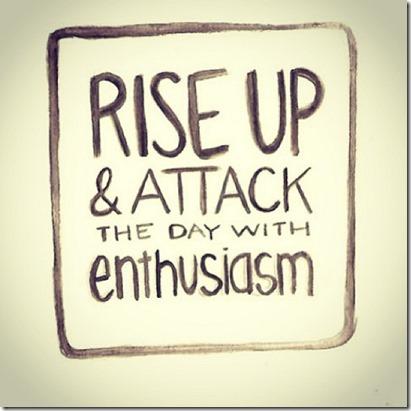According to a paper published from the World Health Organization, the average life expectancy in the United States is 79 years old. People growing up in healthy countries are going above 80 years. Women in Japan are winning, with an average of 86 years.
Let’s assume that you aren’t a woman and you’re not from Japan and your life expectancy is 83 years old (we are just taking a global scale, don’t take my word for granted.) Eighty-three minus eighteen equals sixty-five (83-18=65). Not that you don’t have a life before adulthood, but after 18 years you get to know what life truly is. Everything you do before girds your character to get to know your authentic goals. So let’s get back to calculations.
(65years x 365days = 23725mornings) – let’s circle this to 24.000
So how do we get the most out of 24.000 mornings? The answer lies in the routines.
1. Manage your energy, not your time
If you take a couple of minutes to think about it, you’ll probably realize that you are better at doing certain tasks at certain times. For example, my energy is highest three hours after lunch, so that’s when I do my workout every day.
By comparison, I do every creative task until then. I don’t need my workout energy to be spend for those tasks and vice versa, so that’s the best time for me to get them done. And I tend to have my best workouts afternoon, so that’s when I hit the grass (probably the reason I have hard time to start the marathons with full power early in the morning.)
What type of energy do you have in the morning? What task is that energy best suited for?
2. Prepare the night before
I don’t do this nearly as often as I should, but if you only do one thing each day then spend a few minutes each night organizing your to–do list for tomorrow. When I do it right, I’ll outline the article I’m going to write the next day and develop a short list of the most important items for me to accomplish. It takes 10 minutes that night and saves 3 hours the next day.
It doesn’t necessarily have to be for an article. Just do a quick organization to save a lot of your energy for the big task.
3. Don’t open email until noon
Sounds simple. Nobody does it. It took me awhile to get over the urge to open my inbox, but eventually I realized that everything can wait a few hours. Nobody is going to email you about a true emergency (a death in the family, etc.), so leave your email alone for the first few hours of each day. Use the morning to do what’s important rather than responding to what is “urgent.”
4. Turn your phone off and leave it in another room
I used to do it for 6 months and it went pretty well!
Just leave it on your colleagues desk. Or at the very least, put it somewhere that is out of sight. This eliminates the urge to check text messages, Facebook, Twitter, and so on. This simple strategy eliminates the likelihood of slipping into half–work where you waste time dividing your attention among meaningless tasks.
It takes gigantic time to shift your gaze from one thing to another, especially from crucial ones to checking Instagram notifications.
5. Work in a cool place
Have you ever noticed how you feel groggy and sluggish in a hot room? Turning the temperature down or moving to a cooler place is an easy way to focus your mind and body. Cozy places give the sense of rest, while a little bit cooler places (not the North Pole) gives us a breeze of faster blood flow and energy.
6. Sit up or stand up
Your mind needs oxygen to work properly. Your lungs need to be able to expand and contract to fill your body with oxygen. That sounds simple enough, but here’s the problem: most people sit hunched over while staring at a screen and typing.
When you sit hunched over, your chest is in a collapsed position and your diaphragm is pressing against the bottom of your lungs, which hinders your ability to breathe easily and deeply. Sit up straight or stand up and you’ll find that you can breathe easier and more fully. As a result, your brain will get more oxygen and you’ll be able to concentrate better.
(Small tip: When sitting, I usually place a pillow in the small of my back. This prevents my lower back from rounding, which keeps me more upright.)
7. Develop a “pre–game routine” to start your day
My morning routine starts by pouring a cold glass of water (usually two to make it half a litter), a quick workout of 3 minutes and 10 minutes of meditation (I brush my teeth and face too!).
Some people kick off their day with just ten minutes of meditation. Similarly, you should have a sequence that starts your morning ritual. This tiny routine signals to your brain that it’s time to get into work mode or exercise mode or whatever mode you need to be in to accomplish your task. Additionally, a pre–game routine helps you overcome a lack of motivation and get things done even when you don’t feel like it.
So what’s your secret of using your 24.000 mornings to happiness and success?
